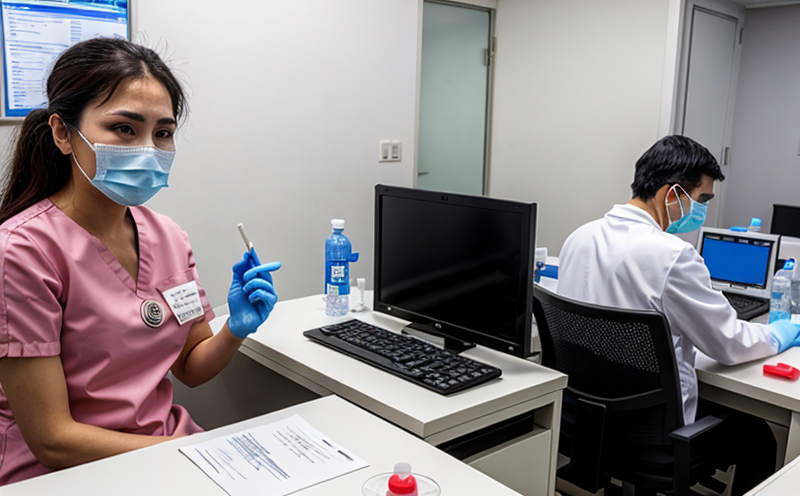Classical Swine Fever Virus Antibody Testing in Pigs
The Classical Swine Fever (CSF) virus is a highly infectious agent that belongs to the genus Flavivirus. This virus poses a significant threat to pig populations, leading to severe economic losses due to high mortality rates and reduced productivity. The CSF antibody testing in pigs is crucial for identifying infected animals early in the disease process, allowing for effective quarantine, culling, or treatment measures.
At Eurolab, we offer comprehensive Classical Swine Fever Virus Antibody Testing using validated methods that follow international standards such as ISO 15189 and EN ISO/IEC 17025. Our testing protocols ensure accurate detection of specific antibodies against the CSF virus in serum or plasma samples collected from pigs.
The process begins with proper specimen collection, which involves drawing blood into vacutainers containing anticoagulants like EDTA. The sample is then transported to our laboratory under strict temperature controls to maintain its integrity until processing. Once received at Eurolab, the specimens are subjected to rigorous quality control checks before being tested using either ELISA (Enzyme-Linked Immunosorbent Assay) or IFA (Indirect Fluorescent Antibody Test).
Both methods measure IgG antibodies against CSF virus antigens. The ELISA technique provides quantitative results, while the IFA offers qualitative assessments. Both approaches are highly sensitive and specific for detecting CSF antibodies in pigs.
The testing procedure typically takes around 48 hours from receipt of the sample to final result reporting. Eurolab ensures that all test results meet stringent accuracy standards set forth by relevant regulatory bodies worldwide, including OIE (World Organization for Animal Health).
Understanding the dynamics of CSF antibodies is vital not only for controlling outbreaks but also in developing effective vaccination strategies aimed at preventing future occurrences. By accurately identifying infected animals early on through antibody testing, farmers and veterinarians can implement targeted interventions that minimize disease spread within pig herds.
The importance of timely diagnosis cannot be overstated; delayed action could lead to widespread infection, resulting in substantial financial losses for affected farms as well as public health concerns if the virus escapes containment measures. Early detection via antibody testing plays a key role in mitigating these risks by enabling quick response actions such as culling or quarantine procedures.
Our experienced team of technicians and scientists at Eurolab employs advanced technologies to ensure reliable test outcomes every time, adhering strictly to protocols outlined by leading organizations like WHO (World Health Organization) and FAO (Food and Agriculture Organization). This commitment to excellence ensures that our clients receive accurate, timely results they can rely upon when making critical decisions about their livestock management practices.
In summary, Classical Swine Fever Virus Antibody Testing in pigs is an essential tool for managing this potentially devastating disease. By providing rapid, accurate diagnostic information, Eurolab contributes significantly to ensuring the health and welfare of domestic swine populations globally.
Benefits
Implementing Classical Swine Fever Virus Antibody Testing in Pigs brings numerous advantages to pig farmers and veterinarians alike:
- Early Detection: Identification of infected animals at an early stage enables swift intervention measures, reducing the risk of further spread.
- Accurate Diagnosis: Reliable test results help differentiate between naturally acquired immunity from vaccination, thereby guiding appropriate management strategies.
- Economic Savings: Prevention of costly outbreaks translates into significant financial benefits for affected farms.
- Informed Decision-Making: Timely information allows for better-informed decisions regarding herd health and production practices.
- Global Compliance: Meeting international standards ensures compliance with global trade requirements, enhancing market access opportunities.
- Enhanced Animal Welfare: Prompt identification of infected individuals facilitates humane treatment options like culling or isolation.
- Sustainable Production: By preventing disease outbreaks, this testing contributes to sustainable pig farming practices that promote long-term viability.
In conclusion, incorporating Classical Swine Fever Virus Antibody Testing into routine veterinary care offers a range of benefits aimed at protecting both animal and human health while supporting economic stability within the industry.
Eurolab Advantages
At Eurolab, we pride ourselves on delivering excellence in Classical Swine Fever Virus Antibody Testing. Here are some key advantages that set us apart:
- Accurate Results: Our rigorous quality control measures ensure high precision and reliability of test outcomes.
- State-of-the-Art Facilities: Equipped with cutting-edge technology, our laboratories provide precise measurements and analyses.
- Comprehensive Support: We offer extensive consultation services tailored to meet the unique needs of each client.
- International Standards Compliance: Adherence to ISO 15189 and EN ISO/IEC 17025 guarantees adherence to global best practices.
- Swift Turnaround Time: Our efficient processes mean faster results, enabling quicker decision-making.
- Credibility: Eurolab is accredited according to ISO/IEC 17025:2017 and CNAL (China National Accreditation Laboratory).
- Dedicated Team: Our highly skilled professionals are committed to providing top-notch service.
These factors combine to make Eurolab the premier choice for Classical Swine Fever Virus Antibody Testing services, ensuring peace of mind and optimal outcomes for our clients.
Environmental and Sustainability Contributions
The practice of Classical Swine Fever Virus Antibody Testing in pigs plays a pivotal role in environmental conservation efforts by preventing the spread of this highly infectious disease. Here’s how:
- Epidemic Control: By identifying infected animals early, we can prevent the outbreak of epidemics that would otherwise result from unchecked viral transmission.
- Biodiversity Preservation: Containing the spread of CSF helps protect local ecosystems from potential disruptions caused by widespread mortality among pig populations.
- Resource Efficiency: Effective management practices enabled through accurate testing contribute to resource conservation efforts, particularly water and feed usage in confined spaces like farms.
- Economic Stability: Preventing large-scale losses due to disease outbreaks supports the economic sustainability of agricultural communities involved in pig farming.
- Human Health Protection: By reducing the risk of zoonotic transmission, we contribute to overall public health security.
- Social Responsibility: Commitment to animal welfare and responsible stewardship reflects our dedication to social responsibility within the broader community.
Incorporating Classical Swine Fever Virus Antibody Testing into standard operating procedures underscores Eurolab’s commitment to environmental sustainability and responsible resource management, fostering a healthier planet for future generations.





